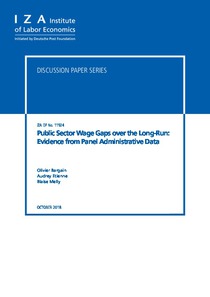Public sector wage gaps over the long-run: evidence from panel administrative data

Bargain, Olivier ; Etienne, Audrey ; Melly, Blaise
Institute of Labor Economics, Bonn
IZA - Bonn
2018
42 p.
wage differential ; public service ; public sector
Discussion Paper
11924
Wages and wage payment systems
English
Bibliogr.
"With the increase in national debts, pay freezes are imposed for several years in the public sector of some countries, at the risk of decreasing the quality of public services. Since public wage setting policies should account for relevant comparisons with the private sector, we provide novel evidence on the public sector wage gap throughout the wage distribution in France, taking a long-term perspective. We exploit a long administrative panel dataset (1988-2013) and suggest methodological innovations. We estimate the public sector premia/penalties on the unconditional wage distribution while accounting for quantile-specific fixed effects and a jackknife correction for the potential incidental parameter bias. We find that the public wage gap is broadly negative in France, with larger penalties at the top, which contribute to a compression of the wage distribution by the public sector. We show that this compression effect is partly concealed by the incidental parameter bias. Time changes in the wage gap over 25 years are consistently explained by a mix of political and business cycles. The unobserved skill gap between sectors reveals the extent of positive selection into public jobs. It tends to decline in the 1990s, a period characterized by the growth of public employment and a move towards less selective recruitment schemes. More critically, it totally disappears among top earners in the recent period, suggesting the detrimental effect of nominal wage freeze and the absence of performance-based remuneration among public sector executives."
Digital
The ETUI is co-funded by the European Union. Views and opinions expressed are however those of the author(s) only and do not necessarily reflect those of the European Union or the ETUI.